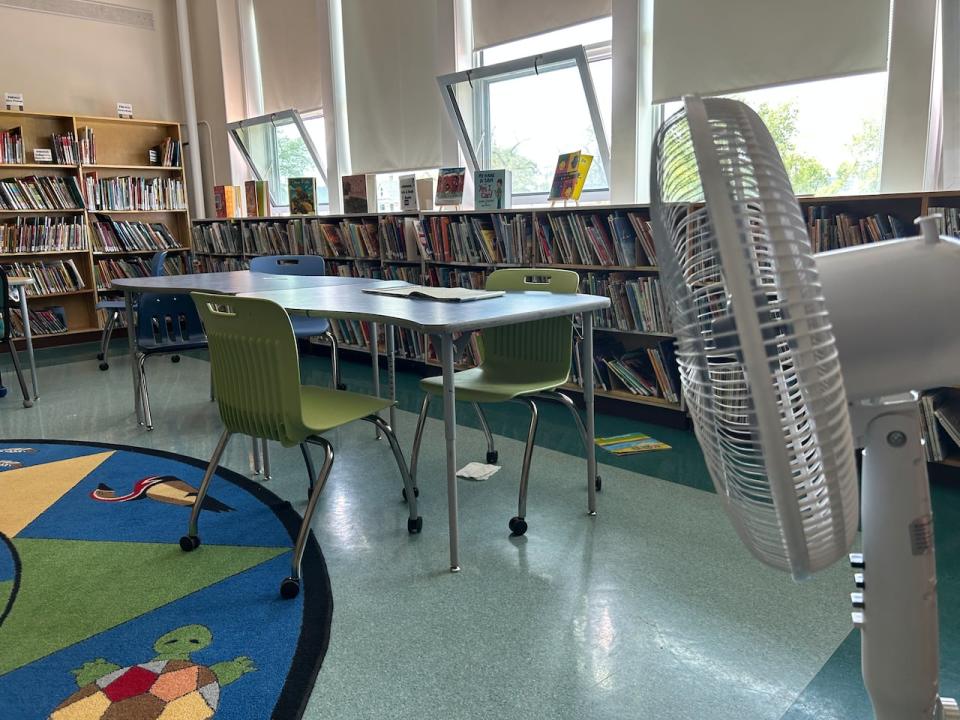Teachers' union to grieve working in extreme heat when students off
The teachers' union plans to file a grievance against the province after some teachers had to work June 20, even though most students had the day off or were dismissed early due to the extreme heat.
Peter Lagacy, co-president of the New Brunswick Teachers' Federation, described the final days of the school year as "considerably challenging for many."
"Teachers must follow their employers' directives," he said in an emailed statement.
"This situation is complex due to the lack of consistency across the province and in cases where there was a violation of the collective agreement, we will be left with no choice to file a grievance."
The francophone school districts told parents to keep their children home on June 20 with a few exceptions, and most of the anglophone districts sent students home early that day.
Environment Canada had issued heat warnings across the province, with a maximum temperature of 30 C to 35 C forecast and the humidex making it feel more like 39 to 45.
Heat warnings are issued when very high temperature or humidity conditions are expected to "pose an elevated risk of heat illnesses, such as heat stroke or heat exhaustion," according to the weather agency.
Violation of Article 16, union alleges
The union contends forcing teachers to work was a violation of Article 16 of their collective agreement.
Under Article 16, when a school is closed due to bad weather, teachers of that school are not required to be present.
In addition, when a school is closed by order of the employer, teachers are not required to be present unless activities requiring their presence have been planned, or students have been transferred elsewhere, in which case teachers may have to work there.
'Districts decide,' says minister
Education Minister Bill Hogan had little to say on the matter.
"We recently got through a very awful week for June. Our schools are very hot right now," he told reporters in French.
"Districts decide whether to close entirely or just partially. I don't know the specifics of what happened with the teachers. It is up to the federation to determine whether to file a grievance."
As of Wednesday, the department had not received any grievances, spokesperson Judy Désalliers told CBC News.
She declined further comment, directing inquiries to the school districts.
Left up to schools, says Francophone South
Francophone South School District initially asked all school staff to report to work on that Thursday, "but given the intensifying heat, we reassessed this position," spokesperson Geneviève Chiasson said in an email in French.
"Their presence at school on the afternoon of June 20 was left to the discretion of the principals and vice-principals of each school."
Students at 35 of Francophone South's schools had the full day off because 34 of those schools don't have air conditioning, and the air conditioning system at the other one is under repair, Chiasson confirmed.
Students at Centre scolaire Samuel-de-Champlain in Saint John were dismissed three hours early, with those in kindergarten to Grade 2 leaving at 11:15 a.m. and those in grades 3 to 8 at 12:25 p.m., she said.
Baie–Sainte-Anne Regional School and Sainte-Anne School, in northeastern New Brunswick, which are both equipped with air conditioning, maintained a normal schedule despite the heat.

Francophone Northwest schools were not closed, spokesperson Monica Martin stressed, "but students were indeed on leave."
"Employees who are able to work remotely were given this opportunity," she said in French. "It should be noted that all our teachers have the appropriate tools to telework," she added.
Francophone Northeast, which closed its schools to students after temperature samples it collected in schools and school buses on June 19 confirmed "a very high ambient temperature," did not respond to a request for comment about whether its teachers had to work.
Anglophone South, which sent K-8 students home two hours early, "didn't share any directive that teachers at the schools with early dismissal had to remain beyond what is outlined in the collective agreement," said spokesperson Jessica Hanlon.
Anglophone West, which also sent K-8 students home two hours early, is not aware of any grievances, spokesperson Paul MacIntosh said Wednesday afternoon.
"If that changes, there is a process we would follow that does not include any discussion through the media," he said in an emailed statement.
MacIntosh did not respond to other questions, such as whether teachers in his district were required to work, or what type of work they would have to do if there were no classes or students in the schools.
Anglophone North, which issued an early dismissal for students from June 19 to June 21, is unaware of any grievance either, said spokesperson Meredith Caissie.
Asked if teachers had to work when students were not present, she replied: "When there is an early dismissal due to weather, the practice is for teachers to remain at school until after the last students have been dismissed and are safely on route for home. This is usually about 30 minutes after the last bus has been dismissed."
The Anglophone East district did not respond to repeated requests for comment.


